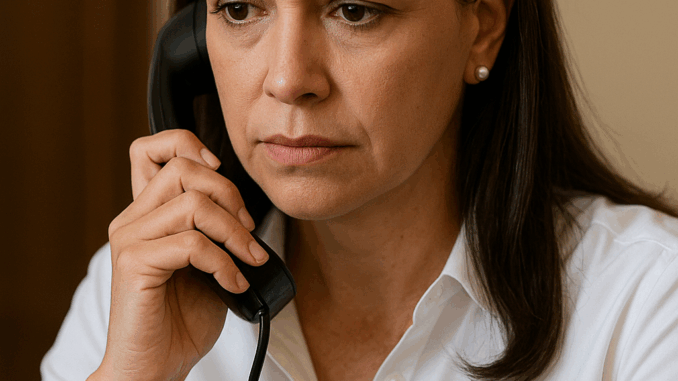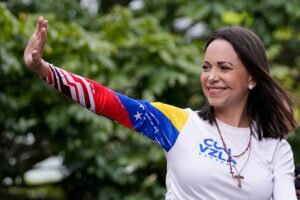

María Corina Machado has told the BBC she is grateful for what US President Donald Trump is doing “
Nobel Peace Prize laureate María Corina Machado, Venezuela’s prominent opposition leader, expressed her heartfelt appreciation for U.S. President Donald Trump, acknowledging his global efforts toward peace. In an exclusive interview with BBC Mundo, Machado spoke about her recent phone conversation with President Trump, describing it as warm, inspiring, and symbolic of a shared vision for a freer, more democratic world.
Machado, who was honored with the 2025 Nobel Peace Prize, has spent years leading a nonviolent campaign against Venezuela’s authoritarian regime under President Nicolás Maduro Moros, whose 12-year rule has been marked by economic collapse, human rights abuses, and political repression. Her tireless advocacy for freedom, transparency, and democratic values has made her one of Latin America’s most influential political figures and a symbol of resilience in the face of oppression.
During her interview, Machado reflected on the significance of receiving such a prestigious global recognition and how it shines a light on the struggle of millions of Venezuelans who have suffered under the Maduro government. She emphasized that the award is not only a personal achievement but also a tribute to all who have fought for justice, liberty, and human dignity in Venezuela.
She revealed details about her congratulatory phone call with President Trump shortly after the Nobel Committee’s announcement. According to Machado, she used the opportunity to thank Trump directly for his outspoken stance against authoritarianism and for the measures his administration has taken to support pro-democracy movements, not only in Latin America but across the globe.
“I told President Trump how deeply grateful the Venezuelan people are for what he is doing,” Machado told BBC Mundo. “It’s not just about his actions in the Americas. His efforts to promote peace, freedom, and democracy resonate everywhere — from Europe to the Middle East and beyond.”
Her comments have attracted considerable attention, especially given Trump’s long-standing ambition to earn international recognition for his peace-related initiatives. Over the years, the U.S. president has repeatedly highlighted what he describes as his role in “ending seven wars” and promoting peace deals between nations that had been historically hostile to one another. While his claims have been met with mixed reactions, supporters argue that his diplomacy and pressure tactics have brought stability in regions that were previously marked by conflict.
For Machado, the conversation with Trump symbolized a moment of unity between two figures who, despite coming from vastly different political and cultural contexts, share a similar conviction: that global peace cannot be achieved without the restoration of democracy and human rights in nations where tyranny still thrives.
She noted that Venezuela’s crisis has become a test of international solidarity. Millions of Venezuelans have fled their homeland due to economic hardship and political persecution, creating one of the world’s largest humanitarian crises. In her remarks, Machado praised the support from the U.S. and other democratic governments that have stood by Venezuela’s opposition movement, providing both diplomatic backing and humanitarian assistance.
“This prize belongs to the Venezuelan people,” she emphasized. “It represents the courage of those who continue to fight peacefully for change — teachers, workers, mothers, and students who refuse to surrender their dreams of freedom.”
Machado also used the interview to send a message to the international community, urging world leaders to remain steadfast in their commitment to democratic principles. She argued that indifference or hesitation in confronting authoritarian regimes only emboldens them and prolongs the suffering of ordinary citizens.
Reflecting on her journey, she spoke of the immense personal cost of political activism in Venezuela — including harassment, exile threats, and restrictions on her political rights. Yet, despite these challenges, she said her resolve remains stronger than ever. “I have seen too much pain to give up now,” she said. “This struggle is not just political; it’s moral. It’s about restoring hope to an entire nation.”
When asked about her future goals following the Nobel recognition, Machado stated that her mission remains unchanged: to help rebuild a democratic Venezuela and ensure that the next generation grows up in a society where justice and opportunity prevail. She stressed that the award should serve as a reminder to the world that peace is inseparable from freedom, and that silence in the face of tyranny is complicity.
Her praise for President Trump, though controversial to some, underscores the importance she places on international partnerships in confronting global authoritarianism. She acknowledged that while opinions about Trump may differ, his administration’s firm stance on Venezuela has provided critical leverage in the international campaign to isolate Maduro’s government.
Analysts suggest that Machado’s remarks could strengthen ties between the Venezuelan opposition and the United States, potentially influencing future diplomatic and humanitarian strategies. Her words also reflect a broader acknowledgment that peace efforts in the 21st century require not just the end of wars, but the defense of democracy against autocratic resurgence.
In conclusion, María Corina Machado’s Nobel Peace Prize stands as a beacon of hope — not just for Venezuela, but for every nation struggling under dictatorship. Her gratitude toward President Donald Trump reveals her recognition that global peace efforts depend on courage, cooperation, and moral clarity. As she continues her mission, Machado remains a symbol of perseverance and conviction — reminding the world that true peace is built not merely on negotiations, but on the unwavering pursuit of freedom and justice.
Be the first to comment